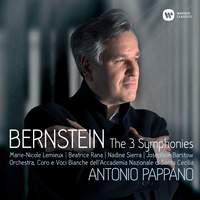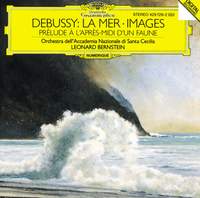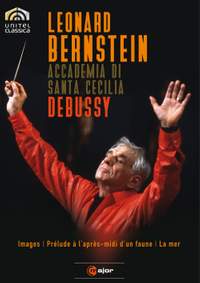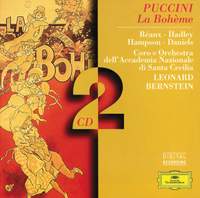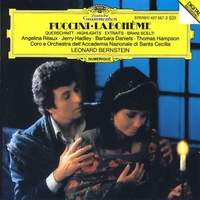Interview,
Antonio Pappano on Bernstein
 To commemorate the centenary of Leonard Bernstein’s birth on 25th August, this week sees the release of his complete symphonies from Antonio Pappano and the Orchestra dell'Accademia Nazionale di Santa Cecilia on Warner Classics. Ahead of their BBC Proms performance of the Jeremiah Symphony this Friday, I spoke to Pappano about the reception of these works in Italy, Bernstein’s relationship with the Roman orchestra, and his own personal encounters with the composer early on in his career…
To commemorate the centenary of Leonard Bernstein’s birth on 25th August, this week sees the release of his complete symphonies from Antonio Pappano and the Orchestra dell'Accademia Nazionale di Santa Cecilia on Warner Classics. Ahead of their BBC Proms performance of the Jeremiah Symphony this Friday, I spoke to Pappano about the reception of these works in Italy, Bernstein’s relationship with the Roman orchestra, and his own personal encounters with the composer early on in his career…
Until comparatively recently, Bernstein's symphonies have tended to be associated with American orchestras and conductors (particularly on disc): how did your Italian players and audiences respond to this music?
This whole undertaking was a way of saying ‘Thank you, Lenny’, because for the last ten years of his life he was the president of my orchestra – he came every year, and he conducted his own music as well as many of the classic works. (He made a recording of Debussy’s music with them, and also a La bohème). There was a very strong relationship, and he loved the way that the orchestra sang, so the hope is that there’s a kind of organic, must-do element to this project. Although the pieces themselves were certainly not fresh in the memories of anybody in the orchestra, a lot of the players did work with him, and so his spirit was always there in performing these pieces. And I think that was true for the audience too – interestingly enough, the spectacle of the Third Symphony (with the narrator, the chorus, the solo soprano) was particularly appreciated. Although it's a bit more eclectic or even chaotic in its style than the first two symphonies, it spoke to my Rome audience very immediately and clearly.
How much do you think that the symphonies have been eclipsed by the tremendous success of works like West Side Story and Candide, and do you see any stylistic overlap between the symphonies and the music-theatre pieces?
There's some overlap in terms of the obvious moments where Bernstein goes into not only jazz mode but a real sort of American frolic; he says something very revealing in the introductory essay to the Serenade for violin and orchestra, where he almost asks for forgiveness for slipping into the jazz idiom in the last movement. He says ‘It’s stronger than me!’ - it's just a part of him, and that's that!
To answer the first part of your question, I do think that those pieces have done a lot to eclipse the symphonies, and they do occupy different spaces: even though West Side Story obviously has a political and a social message, it's very much of the street, it’s very much a show, whereas the symphonies are incredibly personal. As loud as they sometimes are, they’re ultimately very introspective. It's partly down to the subject-matter itself: the First Symphony was written in 1942, and the Second in 1949, so the spectre of war haunts both works. And the Third Symphony was premiered just after the assassination of Kennedy - it comes straight out of the politically hot-to-the-touch atmosphere of the 1960s, and the sense of disillusionment that to this day has not left America…That was the world that created this crisis of faith that is the basis of his symphonies. They're about how Bernstein himself deals with the terrible things that can happen in the world and in society, and so their message is intensely personal: it's as if he is really alone. West Side Story was a huge group effort - it was all about his collaboration with Harold Prince, Jerome Robbins, Stephen Sondheim - but these are simply him. You can really feel his presence in the Second Symphony, The Age of Anxiety, in particular. The piano? That’s him, that’s Lenny! And the narrator? Even though it was conceived for a woman (for his wife, Felicia), it’s Bernstein screaming at God.
And all of that adds up to a far less easy-listening experience for the public; there’s not that immediate feel-good, iconic ‘I recognise this!’ factor that you get with the shows, although in three notes of any of the symphonies you can tell it’s Bernstein. He always had that innate ability: even though he paid homage to almost every composer that he came into contact with, somehow it’s always him. West Side Story and Candide are wondrous, don’t get me wrong, but I think that the symphonies are his true self. Of course, they don’t fit easily into the intellectual debates of the time about the nature of progressiveness in music and the avant-garde, and that's another thing that made life very difficult for these pieces. The whole Boulez coterie, all that intellectual and political circle looked down on them, as they did with Benjamin Britten - but Benjamin Britten had opera, and opera is something that is a domain unto itself and has a public unto itself. Symphonies occupy a more rarefied space, and therefore they're more exposed to the criticism of the self-appointed intelligentsia!
How much does the spectre of Bernstein’s own interpretations of his own music hang over the symphonies?
Hugely! Of course I listened to his recordings, but not for hours and hours on end: I'd study the score, give it a listen, then come back to the printed page…Ultimately you have to find your own way, and I think what you can take away from his recordings is the enormous confidence and ability to hold a tempo in the fast passages, which gives a seemingly unbridled air to the whole thing.
Did you have any direct contact with Bernstein?
I did – in fact I was supposed to assist him on that Bohème recording which he made in Rome. I went to his house to visit him, and we had a fantastic hour together talking about and quoting the libretto. His knowledge of the piece was incredible: I’d grown up in the theatre and so I knew this piece by heart, but how did he? Well, somehow he did! In the end it didn’t work out because I was already engaged to do something with Maestro Barenboim at the same time, so my own story with Santa Cecilia started much later. I also saw Lenny work with a young orchestra in Tanglewood, conducting Copland’s Third Symphony, which is a piece that I absolutely adore and was one of his signature works - firstly because of his friendship with Aaron Copland himself, and also because of his fascination with how to include Americana in music and his conviction that American composers somehow needed to embrace folk and historical elements in their works. It’s a very important piece of music, and to see him put it together marked me somehow – I’ll never forget it.
Bernstein: The 3 Symphonies (Casebound Deluxe)
Orchestra dell’Accademia Nazionale di Santa Cecilia, Sir Antonio Pappano
Antonio Pappano's recording of the Bernstein symphonies is released on Warner Classics this Friday; that evening, he and the Santa Cecilia orchestra will perform the Jeremiah Symphony at the BBC Proms.
Available Formats: 2 CDs, MP3, FLAC, Hi-Res FLAC
Other recordings referenced in this interview
Orchestra dell'Accademia Nazionale di Santa Cecilia, Leonard Bernstein
Available Formats: Presto CD, MP3, FLAC
Orchestra dell'Accademia di Santa Cecilia, Rome, Leonard Bernstein
Available Format: DVD Video
Jerry Hadley, Angelina Réaux, Barbara Daniels, Thomas Hampson; Coro e Orchestra dell'Accademia Nazionale di Santa Cecilia, Leonard Bernstein
Available Formats: MP3, FLAC
Jerry Hadley, Angelina Réaux, Barbara Daniels, Thomas Hampson; Coro e Orchestra dell'Accademia Nazionale di Santa Cecilia, Leonard Bernstein
Available Format: Presto CD


